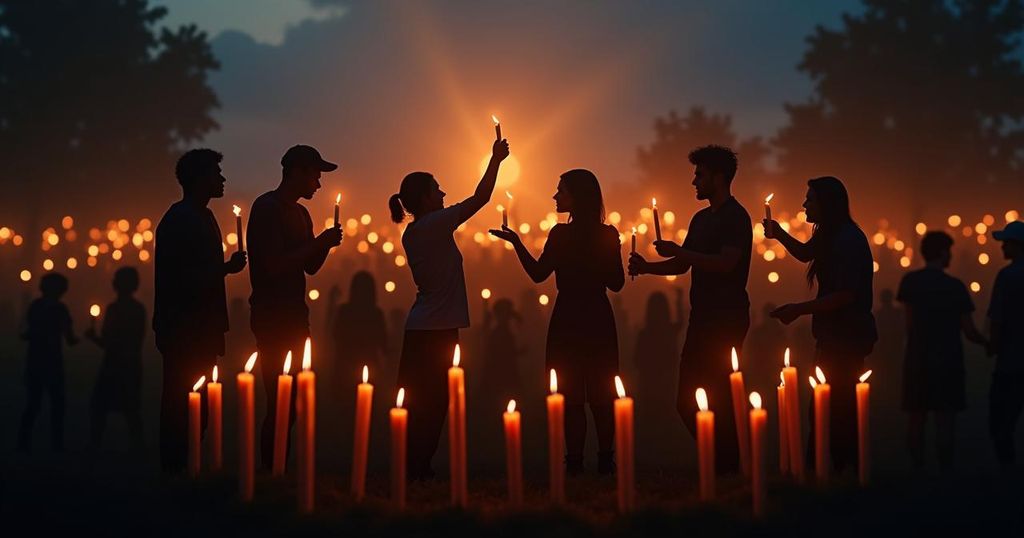Approximately 100 students gathered at the University of Massachusetts Amherst on September 26 for a vigil in solidarity with victims of humanitarian crises in the Democratic Republic of the Congo, Sudan, Lebanon, and Palestine. The event included personal reflections from attendees about the significance of raising awareness and advocating for those affected by conflict. Quotes from participants highlighted the importance of unity and shared humanity among diverse communities.
On the evening of September 26, around 100 students from the University of Massachusetts Amherst convened to participate in a vigil expressing solidarity with individuals affected by the ongoing humanitarian crises in the Democratic Republic of the Congo, Sudan, Lebanon, and Palestine. This event took place on the sidewalk between the Student Union and Campus Pond lawn, where a collaborative announcement was circulated via the social media accounts of the University of Massachusetts Amherst Students for Justice in Palestine, the UMass Amherst Arab Cultural Association, and the African Students Association. As conflicts intensify, including bombardments in the DRC and Israeli airstrikes in Lebanon, as well as extreme shortages of essential resources in Sudan, the vigil aimed to honor and raise awareness of the struggles faced by these communities. Despite the persistent drizzle, the gathering demonstrated resilience, with students sharing umbrellas and seeking shelter under trees. Participants were encouraged to express their sentiments regarding the vigil, allowing for open dialogue. Ridha Alam, a senior biology major and President of the South Asian Student Association, emphasized the importance of using one’s voice to advocate for the marginalized: “It’s really important for people to go up there and use your voice for the voiceless and really open your hearts. It’s really easy to focus on what makes us so different, but if you think about it, we’re all fundamentally the same.” After several individuals shared their thoughts, the space became a forum for collective conversation. Maya Glenn, a senior who attended last year’s vigil, reflected positively on the community’s response: “I feel like if we can come out and at least acknowledge what’s happening on campus altogether, maybe it can give us the push to speak out more, to know that we’re a collective.” She also highlighted the vigil’s significance, given its location near where student protests occurred the previous semester, stating, “This is where the encampment was held, this is where so many students were arrested and brutalized, and then we come here to speak up and share and embrace each other. There is something pretty symbolic and powerful about it.” A female student of Lebanese descent articulated the importance of coming together for a collective moment of reflection and solidarity: “No matter what, everyone, in some way, is affected by these [events]. Whether you are ethnically related to these issues… or if you are just empathetic to the cause.” She noted the interconnectivity of struggles faced by various groups, asserting, “We’re all human at the end of the day, we all bleed the same colors… Even if we’re Palestinian [or Lebanese], wherever we’re from, we’re the same in that we’re one humanity and one people at the end of the day.”
The article discusses a recent vigil held by students at the University of Massachusetts Amherst, aimed at drawing attention to the humanitarian crises occurring in several regions, specifically the Democratic Republic of the Congo, Sudan, Lebanon, and Palestine. As global conflicts and humanitarian issues escalate, students organized this event to express solidarity and raise awareness of the struggles faced by people in these regions. This vigil emphasizes the role of universities in cultivating social awareness and promoting dialogue about pressing global issues, highlighting the importance of community engagement among students.
The vigil at the University of Massachusetts Amherst served as a powerful demonstration of solidarity with individuals suffering from crises in the Democratic Republic of the Congo, Sudan, Lebanon, and Palestine. Students emphasized the importance of collective action and the necessity of using their voices to advocate for those in need. Through shared experiences and open dialogues, participants reinforced the interconnectedness of their struggles, ultimately culminating in a united front dedicated to humanitarian causes.
Original Source: dailycollegian.com







